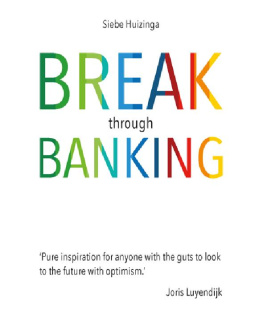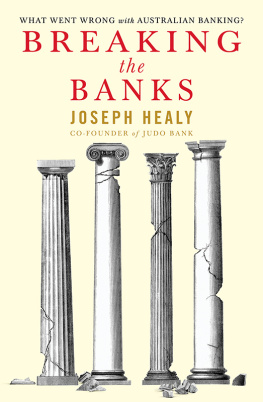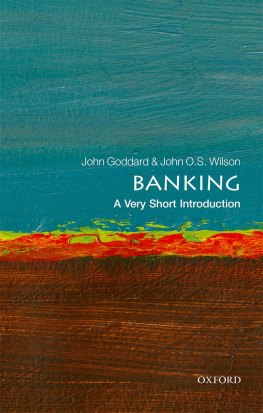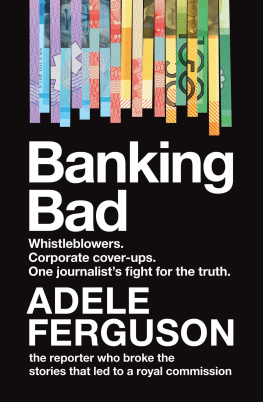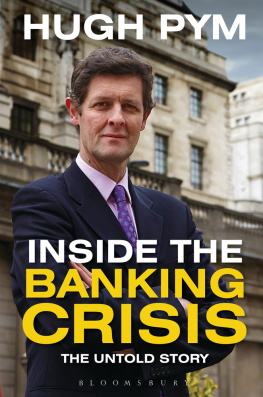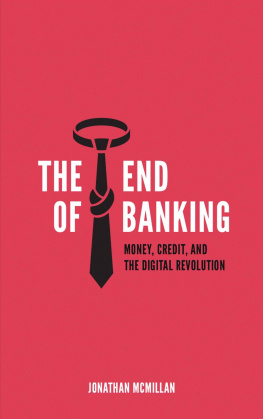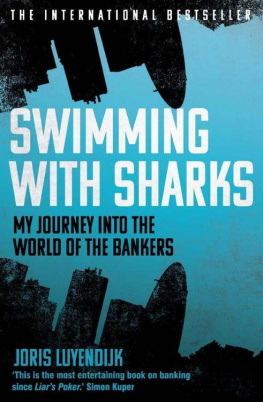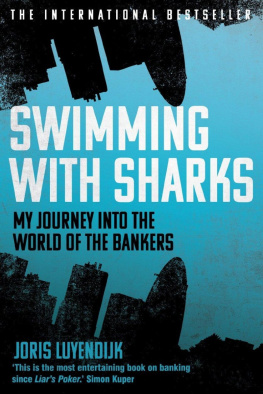

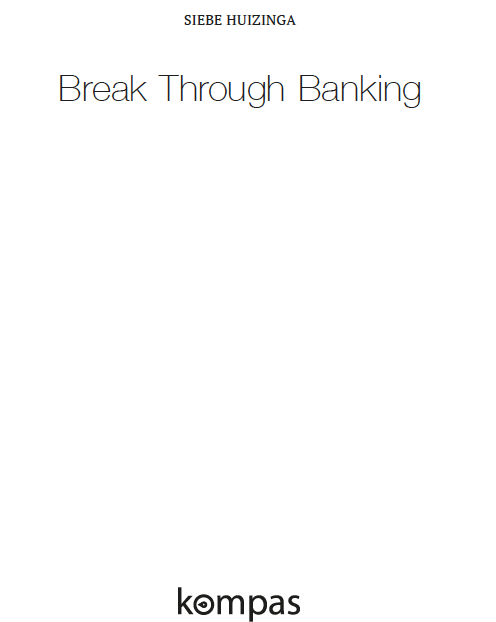
Siebe Huizinga, Uitgeverij Kompas
Translation Czanne Tegelberg
Editor Toon van de Put
Cover Edoardo Mercati
Lay-out Iris Borst
Printed by Ten Brink, Meppel
Ebook Osric Caton
All rights are reserved. No part of this publication may be reproduced, stored in a retrieval system or made public in any form or by any means, electronic, mechanical, photocopying, recording or otherwise, without prior permission of the publisher.
ISBN 978 94 92107 08 4
www.uitgeverijkompas.nl
Fueled with ambition, we are bent on writing history. This could be your chance to be part of a game changing initiative if you are up for it!
bunq
Pure Inspiration
Joris Luyendijk
Its been five years since I immersed myself in the world of mega-banks for my book, Swimming with Sharks . My conclusion was that not much had changed since the 2008 crash, far from it even. Incredibly, its been business as usual.
Then one day Ali called me. Apparently hed been looking at the crisis from a very different angle for the past few years by setting up an entirely new kind of bank. A real Silicon Valley-like start-up, without the comfort of the sunny weather of California, located in an old vacated office building in the cold windy suburbs of Amsterdam.
bunq is no typical bank run by middle-aged men in expensive suits who make their money by taking risks with your money. Its quite the opposite. bunq is a club full of young pups in their twenties, dragged and lured to Amsterdam from all over the world, taken by Alis charisma and his plan. To use new technology and start a bank that doesnt take risks by piggybacking on your money. A bank that makes its earnings simply by providing an excellent service to its clients. Is that even possible? In a tiny country like the Netherlands? Before the big boys in the USA beat them to it?
Yes, as it turns out, it is. And this book will tell you how and why. Its a story about hard-won victories over supervisors and red tape. About breakthroughs and setbacks, personal dramas, arguments and reconciliations. Real stamina and the guts to start over again and again. Its the romance of a start-up, but also the tragedy of compromise and grudging acceptance that the world can only move so fast. And its a surprising story. Because who would have thought that the first challenger of the dinosaur banks would see the light of day thanks to a loan from the ING bank!
Were at the start of a revolutionary age, similar to the 90s, when the first mobile phones popped up. Within a decade those first simple bricks quickly evolved into the hypermodern and user-friendly iPhone 7 or Galaxy 8. The big banks are scared to death of people like Ali said Jeroen Smit, author and expert in banking and innovation, during a Dutch television interview. Or, as a London-based banking expert put it: The question isnt whether IT companies will take over the banking world, its when. Alis pack is spearheading this revolution. Their story is pure inspiration for those daring to believe in a positive future: about a pack of pups in Amsterdam who relentlessly hounded their dreams into reality.
Money Dealers
Banks, says Ali, are money machines. They attract money at the cheapest possible rate, then go on and sell it for as much as they can. Its buy-and-sell, just like your local car dealer. A car dealer promotes his cars by claiming how reliable they are. Somehow, a car has always been owned by an old lady that only used it for her weekly shopping trips. Bankers are barely any different. They too sell reliability by claiming how secure and service-oriented they are. No matter what happens or so they claim theyre going to be there for us. In reality however, banks have long since stopped being financial service providers. Instead, they have become money dealers. They no longer aim for profits gained as a result of satisfied clients, but instead opt for profit no matter what.
Ali shoots a glance at Duke, one of his advisers at TransIP a web hosting company he set up as a twenty-year-old during his university years. In just a few years he expanded it into the largest web-hosting provider of the Netherlands. With around 100 employees and over 200,000 clients, it has a turnover of tens of millions of euros.
Sitting across from each other at a restaurant, they appear to be polar opposites. He, Duke, is of robust build. With his dark-blond hair and cool blue gaze, he looks like the archetype of Dutch sobriety. He gives his full attention to his environment. Ali, boyish, has pitch-black hair and dark, flitting eyes. Hyperactive and constantly multitasking, he is easily distracted. His thoughts always a few steps ahead of the moment.
Their backgrounds are miles apart too. Duke, 43 years old, built his career within the corporate structures of the financial world, moving from company to company. Ali, fourteen years younger, is the self-made man. The nonconformist buccaneer, fan of Nietzsche and Dostoevsky. He prefers building his own corporate structures.
Despite their differences, they share important values and traits. Honesty and an open mind being the two main ones. Without these similarities they would never have connected.
Ali only accepts advice from people he likes and who tell him the truth. Why waste precious time on people who annoy you, or convey cryptic or inaccurate messages? If Ali likes you, and the feeling is mutual, then it must be because you have an open mind, an absolute precondition of innovation in Alis eyes: only open minds can shape the future.
All this crap with bonuses and banks going under? Its all because of this trade-driven mindset of the past few decades. There was a time when banks were our partners. Their service actually contributed to our growth and welfare. The size of their trade and with that their profit was balanced out by the social landscape and kept in control by limitations of the available technology. The improvements in that technology removed barriers and unlocked a potential of endless profits. To achieve those profits, increasingly complex mathematical and interest models were created foregoing client interests and disrupting the once healthy balance. And so while the profits increased, so did the risks. Weve gotten to the point where banks spend most of their time sustaining themselves and thereby sustaining the problems they create. Theyve turned inward, into their own world, their own culture. Their primary objective merely being to survive instead of adding value. Once there was a point to banks but now they have turned into unbound profit-minded machines. The most important question is therefore: whats the next step forward?
Duke listens carefully to what Ali has to say. Hes heard him criticize banks before, but never in such a clear and sharp argument. Alis obviously going somewhere with this
Ali gauges Dukes reaction. He wants to know what he thinks of this new idea: the idea of an innovative, IT- driven bank; a radically renewed bank of the future, spawned from irritation of the existing banking systems self-serving efforts to prop up an outdated money industry.
Alis irritation reached an all-time high a few weeks ago. On a beautiful summer day, during a small picnic, he received a phone call. TransIP was suffering and literally couldnt do any business because one of the primary online payment systems in the Netherlands was down. At that moment, a snippet from something he heard on the radio earlier that morning came to mind. The crisis was in full swing and politicians were scrambling over one another to spew their opinions on the matter. He realized there was something he could do. Why not overturn the banks entire moneymaking system? Why not replace a complex structure made of cards, machines and bank transactions with a simple and direct payment system among people? Hadnt the start of TransIP once been brought on by his annoyance at the amount of paperwork and hand-filled forms that needed to be faxed over, just to register a domain name? The technology to deliver such huge change was already available and the need for change was massive.
Next page
